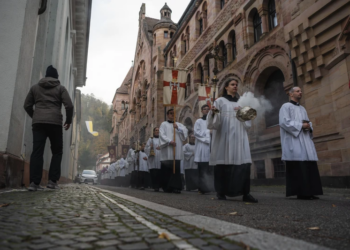Germany today is not just in recession — it’s in a deep systemic crisis of its own making. Once Europe’s industrial benchmark, the country now endures its longest downturn since World War II. Yet rather than own their policy failures, Berlin’s leadership has chosen a convenient scapegoat: Donald Trump.
Green socialism by EU design is a matter of faith. Climate change is entirely man-made, the sun provides us with free energy, and the green transformation promises an economic miracle — you must be deeply committed, given Germany’s economic disasters, not to be branded a heretic. In Germany, it is Green and socialist politicians like Robert Habeck who, under the guise of climate policy, erect a command economy now crumbling before their eyes. (RELATED: Lights Out in Germany)
Self-criticism? None. Instead, they hunt for a culprit: of course, Donald Trump’s tariffs are now blamed, retroactively (do they have time machines in Berlin?), for plunging the German economy into recession for the past three years. This is absurd and a disgrace to the political culture of Europe’s largest economy. It lays bare the desperation of leaders too wedded to ideology to face reality. (RELATED: ‘Liberation Day’ and the Double Standard of EU Policy)
Media and the Globalist Fortress
Politicians like Robert Habeck survive political crises and collisions with reality because they’re shielded by a media cordon sanitaire. For years, ideologically driven outlets in Germany and Europe have toed state-mandated narratives. The nucleus of the EU globalists — climate policy — remains untouchable. Here, the future of both the EU and Germany hangs in the balance. Will they, for rational reasons, return to nuclear power? Negotiate with Putin’s Russia for cheap gas? Or continue down the path of a total command-and-control economy, ridden to death by taxes and regulations? These questions are buried under an avalanche of green rhetoric.
The so-called “Green Deal” is the critical factor in Germany’s — and Europe’s — decline. Presented as a necessary shift toward a cleaner future, it has become a convenient euphemism for deindustrialization. It failed to deliver economic transformation. (RELATED: Climate ‘Changists’ Cashing In, European-Style)
Instead of green jobs and sustainable growth, the Green Deal has wreaked havoc on traditional industries, especially in energy-intensive sectors. It is nothing more than a Keynesian, artificial economic model replacing a dying industry, and it’s controlled by Brussels’s political apparatus. A powerful vehicle — until it breaks down. This centrally planned mirage, orchestrated by Brussels, has left Germany’s industrial engine sputtering, with factories closing and supply chains fraying under the weight of unsustainable costs.
Capital Exodus: A Nation Bleeding Out
This policy pushed Germany into a perpetual recession, its longest economic crisis since WWII. As often in his tenure, Habeck had to revise his overly optimistic growth forecast again just this week. Officially, Berlin forecasts stagnation. But strip out exorbitant government spending — Germany’s spending ratio now sits at 49.5 percent — and the private sector is clearly shrinking. Industry and construction — with PMIs below 50 for years — can’t recover. Productivity has declined since 2017, a consequence of a burdensome state apparatus consuming about 4 percent of GDP — €146 billion annually. These costs show no sign of abating, and no one dares challenge the political class responsible.
This ideological experiment is costing Germany its middle class. Small businesses — the backbone of Germany’s economy — face an existential crisis. The government’s COVID response only accelerated the decline of SMEs, suffocating them with overregulation, high energy costs, and an expanding welfare state. The result: a shrinking middle class and growing state dependence.
In 2024 alone, Germany lost €67 billion in direct investments, and the trend shows no abating. This capital flight destroys well-paying, valuable jobs that could have anchored future growth. Instead of addressing root causes, Germany’s leadership clings to a failed climate agenda, draining the nation’s economic vitality. Compounding the issue, skilled workers are leaving for countries with lower taxes and fewer regulations, further eroding Germany’s economic base.
A Call for Radical Reform
The truth is that the EU’s protectionism, bureaucracy, and devastating climate agenda are accelerating Germany’s (and the EU’s) decline, while its leaders remain fixated on political expediency. The industrial heartland is being hollowed out — a giant rust belt in the making. The future looks bleak unless Berlin’s leadership faces reality and radically shifts governance and economic policy.
It is obvious now: The green-socialist ideology has failed, and Donald Trump has just shone a spotlight on that fact. Germany should react rationally and must reduce state interference, slash bureaucratic costs, and embrace free-market, pro-business principles to escape its self-made trap. Above all, it must abandon the illusory “green economy,” this artificial monstrosity — a move that will hurt tens of thousands of subsidized companies but is worth the pain in the long run. Urgently, Germany should dismantle hidden trade barriers and regulatory hurdles stifling growth and international competitiveness.
With its heavy reliance on exports, Germany must rebuild economic and geopolitical partnerships without submitting to the power machine in Brussels. Particularly, its relationship with the U.S. should be repaired as soon as possible. That means pursuing a level playing field, where trade flows freely and without unnecessary barriers. The sooner Germans wake up, the sooner they can reverse the damage wrought by misguided policies and ideological madness. Failure to act risks turning Germany into a cautionary tale of how dogma can destroy prosperity.
READ MORE from Thomas Kolbe:
Is Beijing Overplaying Its Hand?


![Reality Hits Adam Schiff in San Francisco—It’s Not Pretty for Democrats [WATCH]](https://www.right2024.com/wp-content/uploads/2025/04/Reality-Hits-Adam-Schiff-in-San-Francisco—Its-Not-Pretty-for-350x250.jpg)


![Trump’s White House Trolls Illegal Alien Gangs With Hilariously Brutal Video [WATCH]](https://www.right2024.com/wp-content/uploads/2025/03/1742261427_Trumps-White-House-Trolls-Illegal-Alien-Gangs-With-Hilariously-Brutal-350x250.jpg)


![James Comer Hints at the Epic Behind-the-Scenes Effort Targeting the Deep State [WATCH]](https://www.right2024.com/wp-content/uploads/2025/04/James-Comer-Hints-at-the-Epic-Behind-the-Scenes-Effort-Targeting-the-350x250.jpg)


![Dem Strategist James Carville Goes on His Most Delusional Rant to Date [WATCH]](https://www.right2024.com/wp-content/uploads/2025/03/Dem-Strategist-James-Carville-Goes-on-His-Most-Delusional-Rant-350x250.jpg)





